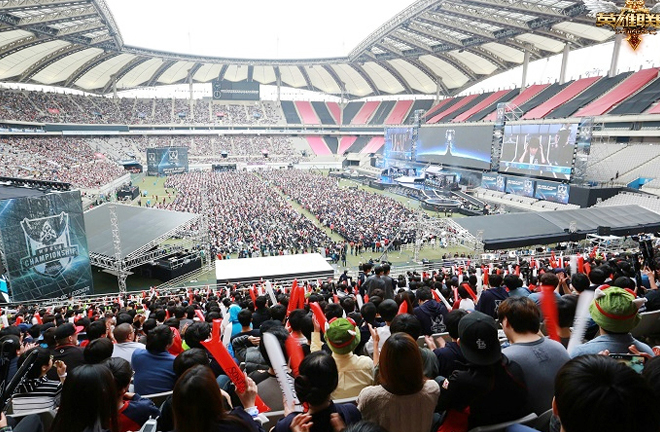Social development creates wider research field for sports sociology

Electronic sports events such as the League of Legends World Championship are changing people’s understanding of traditional sports. Photo: FILE
Arising from sports practice, sociology of sports aims to answer various social problems that accompany sports and to provide a theoretical basis for their sound development.
Lyu Shuting, a professor at Guangzhou Sport University, said that externally, sports sociology takes sports as an evolving entity so as to study its relationships with other social phenomena with the help of sociological theories and methods. Internally, sports sociology studies the social relations, social functions, social structures and social processes of sports itself. The discipline aims to promote the harmonious development of sports and society.
At a macro level, the research field of the discipline includes the relationship between sports and social structures, social changes, social control, politics, economy, education, science and technology, and culture. At a micro level, the study covers the internal social system, institutional system, cultural system, sports socialization and sports behaviors. In addition, sports sociology also deals with many social issues and associations in sports, such as those between sports and travel, sports and leisure, and youth sports, said Wang Xuguang, a professor at Tianjin University of Sport.
Liu Depei, a professor at Shenyang Sport University, said that with the development of sports and its wide penetration into people’s lives, sports, as a social medium, has bound people of different races, ages, genders, industries and social positions together, forming a “sub-society.” Sociology of sports focuses on the sub-social organization, structure, communication channels and methods, aiming to reveal the internal laws of operation of this sub-society.
Qiu Jun, a professor from the Division of Sports Science and Physical Education at Tsinghua University, said that modern technological innovation and commercial development have given birth to new sports events, such as unmanned aerial vehicle competitions, electronic sports and parkour, which are challenging people’s understanding of traditional sports. The emergence, development and popularization of emerging sports events will become new research areas due to their complexity.
Lyu added that sociology of sports comprehensively uses sociological methods such as interviews, questionnaires, observation and case studies to study sports. Researchers are also trying to implement approaches from other disciplines.
Liu mentioned that when studying the law of the occurrence and development of sports, the most commonly used method would be historical data analysis; when exploring the law of interaction between sports and other social phenomena, a large-area or regional sampling survey is the most effective. In addition, we need to selectively use observation methods, case studies or even laboratory experiments to study the social effects of sports on different groups.
We should adopt multi-disciplinary theories and different perspectives to study the issues in sports and to explore the role of sports in human society and its future direction, Qiu suggested. In the future, predicting the development trends of specific sports events and audience actions through econometric modeling will become a new focus of research for scholars.
Researchers of sports sociology need to pay attention to and track issues in the Chinese sports field. The important issues that relate to national strategy, national health and sports reform programs, such as the fitness-for-all national strategy, the Healthy China strategy, sports reform, campus football and the development trend of Chinese sports, all require special academic concern, Lyu said.
Qiu added that the study of sports sociology should focus on social issues in Chinese sports. The rapid development of the era has exerted an extensive and profound impact on both competitive sports and popular sports, triggering a series of social problems. It is urgent for Chinese researchers in this field to improve their ability to deal with these problems.
With China’s economy and society moving forward, the unique role of sports in politics, economy, culture and society has become increasingly prominent. Thus, reform and development within the sports industry have received growing attention. Meanwhile, it should be noted that the research of sports sociology is also facing many challenges. There remains vast room for development, including the fostering of a more in-depth grasp of sociological theories, the application of sociological research methods and the construction of local theories and discipline systems of sports sociology. In particular, with the advancement of the modernization of the national governance system and governance capabilities, research topics such as those dealing with sports governance modernization and reform of sports management systems should be given special attention, Wang concluded.
edited by YANG LANLAN

 PRINT
PRINT CLOSE
CLOSE